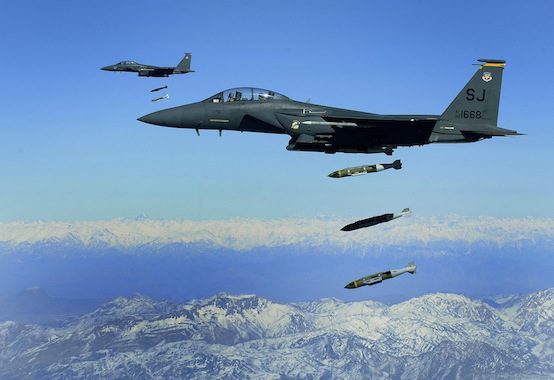Questions to Ask Before Bombing Iraq

The United States has become addicted to the application of lethal military power. A great many in our country have become convinced that dispatching the U.S. Armed Forces—or the threat thereof—to solve almost every international problem has kept us safe over the decades, and is the only thing that will ensure our security into the future. Yet evidence is piling up that the continuous and expanding use of American killing power is having a deteriorating effect on our national security and a destabilizing effect globally. Far from making us more secure and the world safer, our perpetual use of the military frequently fosters instability. The current situation in Iraq demonstrates this dangerous proclivity.
In recent weeks the government of Iraq has been losing first battles, then entire cities to a rising militant Islamic group known as the Islamic State of Iraq and Syria (ISIS). Many in the United States are calling on President Barack Obama to immediately order airstrikes. A certain segment of those demanding immediate action pin the blame for the deteriorating situation on the White House for withdrawing American forces from Iraq in 2011, and they want to rectify the situation by reapplying military force now. Yet there appears to be no consideration among the various advocates of lethal strikes for what comes next. The failure to examine the “what next?” question has become an increasingly common feature of U.S. strategic thought.
The George W. Bush administration was roundly criticized for invading Iraq in March 2003 without an adequate plan for managing the country after the regime fell. The Obama administration has likewise been accused by many of having no plan for what came next following the 2011 airstrikes in Libya. The current hysteria in Washington over ISIS gains seem to have ignored these acknowledged errors of the past. While there is an eagerness to once again unsheathe the American sword, there has been virtually no discussion of the tactical and strategic utility of such actions, nor consideration of the potential consequences.
For eight years, the U.S. and NATO fought an insurgent war in which almost 4,500 Americans lost their lives, and over 32,000 were wounded. Conservative estimates suggest that approximately 133,000 Iraqi citizens were killed from 2003-2011, and at least 3.5 million human beings were displaced from their homes. As unpleasant as life was for the average Iraqi citizen before our invasion, it cannot compare to the misery under which they’ve suffered since. A similar dynamic continues to play out in Afghanistan. Libya has suffered in a state of near anarchy since our 2011 air campaign. Pakistan, Yemen, and now a growing part of Africa have all seen a continual deterioration in their security corresponding to a rise in the application of U.S. military force and firepower.
Before adding yet another combat mission to the American logs in Iraq, we must ask a number of critical questions. Tactically, will airstrikes against the ISIS prove decisive militarily, or will they exacerbate the violence? Since ISIS personnel have the ability to blend in and out of the civil population, how will our jets or drones identify the “bad” civilians from the “good” civilians? Who will act as ground controllers to ensure bombers strike only valid military targets? What will be the American culpability if U.S. bombs kill civilians, or if air planners are given false intelligence that results in political opponents of the regime being killed? Will the attacks cause the population to reject the rebels—or to support them even more strongly?
Politically, will a new round of promises of political inclusion from the Iraqi Prime Minister hold if American planes and drones succeed in killing enough of his opponents? What if it is discovered that the current government of Iraq was culpable in bringing about the conditions that spawned this uprising? Might then American military power have been used, free of charge, by a corrupt government to eradicate its enemies, allowing it to continue in abusive power? These are critical questions that have to be answered before launching any military operation. Yet almost none of these questions appear to have been considered—much less answered—by those people most enthusiastically advocating strikes.
At some point we must be willing to recognize the stark truth that this excessive use of lethal military power has worsened our national security.
I am a strong advocate of having a powerful military that can crush opponents when our life, liberty, or vital interests are at risk. But we must abandon the “bomb first, think later” mindset and instead invest in solutions that seek to first understand, then address the underlying causes of violence and instability. This type of international engagement is harder and takes longer than ordering up airstrikes. Yet it offers the potential to reduce the danger to America, diminish the conditions in which rebellions and violence often breed, and help citizens of other countries achieve stability. It is in this way that our vital interests can best be safeguarded. Fail to learn these lessons, however, and our own national security will continue to deteriorate.
The opinions in this article are those of the author alone and do not represent the views of the Department of Defense or the Department of the Army.
Daniel L. Davis is a Lt. Col. in the U.S. Army stationed in the Washington, D.C. area. He has been deployed into combat zones four times, winning the Bronze Star Medal for Valor in Desert Storm.
Comments